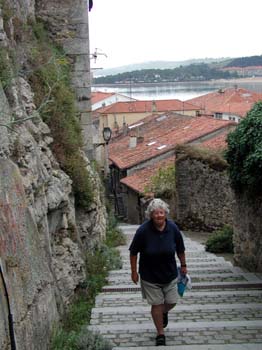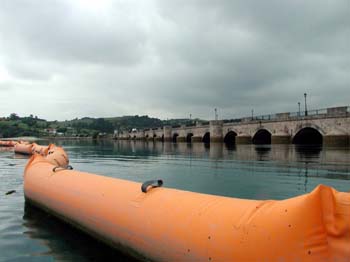Llanes to San Vincente de la Barquera - Monday, 21 July 2003,
16 miles
Set sail after a late lunch in a South Westerly F2 -3. The
rain had stopped, and the sky partly cleared, with visibility of
around 10 miles, so we had a nice reach past some beautiful
scenery. We sailed past Ria de Tina Major and Ria de Tina Minor,
two clefts in the cliffs opening into wide lagoons. Their
isolation is a little spoilt by the, admittedly magnificently
engineered, motorway viaducts on their inland sides.
San Vincente from the anchorage
 At 19:00, we entered the
ria of San Vincente de la Barquera. This is a rather lovely
estuary, with a broad lake with bags of space to anchor. Around
the edges are the town of San Vincente de la Barquera itself, two
long low bridges crossing the inlets from two rivers, one
apparently medieval, and some slightly unfortunate modern
apartment blocks, all with mountains as a backdrop.
At 19:00, we entered the
ria of San Vincente de la Barquera. This is a rather lovely
estuary, with a broad lake with bags of space to anchor. Around
the edges are the town of San Vincente de la Barquera itself, two
long low bridges crossing the inlets from two rivers, one
apparently medieval, and some slightly unfortunate modern
apartment blocks, all with mountains as a backdrop.
In the evening we were entertained by a pop group on the shore
which set world class standards for tunelessness and
amplification power. Amazingly, at eleven o'clock the church
bells struck, and the pop group stopped. The church bells were a
bit special too. The original metal bells had been locked
stationary, and their function replaced by loudspeakers in the
bell towers. The effect was rather spoiled by the distortion from
having the amplifier turned up above its designed rating, and
then having the recording terminate a millisecond or so into the
reverberation.
A lane leading to the citadel in the old
town
 Next morning we explored
the town properly. Above pleasant nineteenth century buildings in
the commercial area, lanes and steps lead up to the historic
citadel, with a castle, school of navigation and very fine
church.
Next morning we explored
the town properly. Above pleasant nineteenth century buildings in
the commercial area, lanes and steps lead up to the historic
citadel, with a castle, school of navigation and very fine
church.
The grounds of the church had massive walls, set at the edge
of the steep, wooded slopes falling down to the river on one side
and town on the other. As we gazed at the view, someone let off a
volley of maroons on the hillside opposite. Goodness knows why -
we thought the Spanish just liked maroons.
Barrage protecting the old bridge at San
Vincente
 On the dinghy ride back
to Razzmatazz, we went to inspect the older bridge. It, or rather
the river above it, was protected from "Prestige" oil by a
flexible, plastic tube. We'd noticed these from afar in other
rias. The Spanish appear to have done a superb job in clearing
up. The only problems we had were once, when we trailed washing
to rinse it on a rope astern, when it picked up some tar, and
from ladders in small harbours, which typically had tar on
them.
On the dinghy ride back
to Razzmatazz, we went to inspect the older bridge. It, or rather
the river above it, was protected from "Prestige" oil by a
flexible, plastic tube. We'd noticed these from afar in other
rias. The Spanish appear to have done a superb job in clearing
up. The only problems we had were once, when we trailed washing
to rinse it on a rope astern, when it picked up some tar, and
from ladders in small harbours, which typically had tar on
them.
 At 19:00, we entered the
ria of San Vincente de la Barquera. This is a rather lovely
estuary, with a broad lake with bags of space to anchor. Around
the edges are the town of San Vincente de la Barquera itself, two
long low bridges crossing the inlets from two rivers, one
apparently medieval, and some slightly unfortunate modern
apartment blocks, all with mountains as a backdrop.
At 19:00, we entered the
ria of San Vincente de la Barquera. This is a rather lovely
estuary, with a broad lake with bags of space to anchor. Around
the edges are the town of San Vincente de la Barquera itself, two
long low bridges crossing the inlets from two rivers, one
apparently medieval, and some slightly unfortunate modern
apartment blocks, all with mountains as a backdrop. Next morning we explored
the town properly. Above pleasant nineteenth century buildings in
the commercial area, lanes and steps lead up to the historic
citadel, with a castle, school of navigation and very fine
church.
Next morning we explored
the town properly. Above pleasant nineteenth century buildings in
the commercial area, lanes and steps lead up to the historic
citadel, with a castle, school of navigation and very fine
church. On the dinghy ride back
to Razzmatazz, we went to inspect the older bridge. It, or rather
the river above it, was protected from "Prestige" oil by a
flexible, plastic tube. We'd noticed these from afar in other
rias. The Spanish appear to have done a superb job in clearing
up. The only problems we had were once, when we trailed washing
to rinse it on a rope astern, when it picked up some tar, and
from ladders in small harbours, which typically had tar on
them.
On the dinghy ride back
to Razzmatazz, we went to inspect the older bridge. It, or rather
the river above it, was protected from "Prestige" oil by a
flexible, plastic tube. We'd noticed these from afar in other
rias. The Spanish appear to have done a superb job in clearing
up. The only problems we had were once, when we trailed washing
to rinse it on a rope astern, when it picked up some tar, and
from ladders in small harbours, which typically had tar on
them.